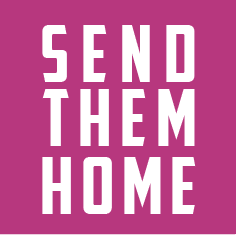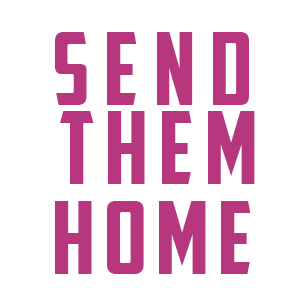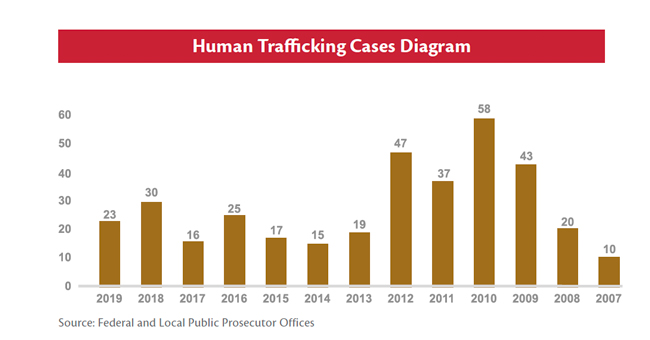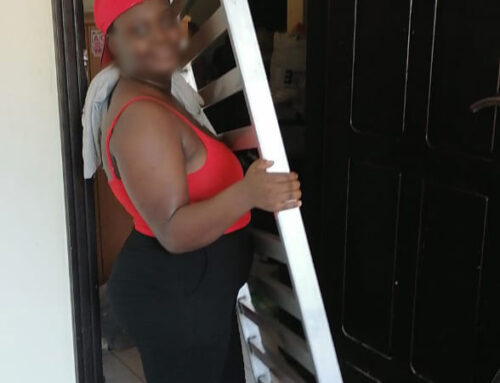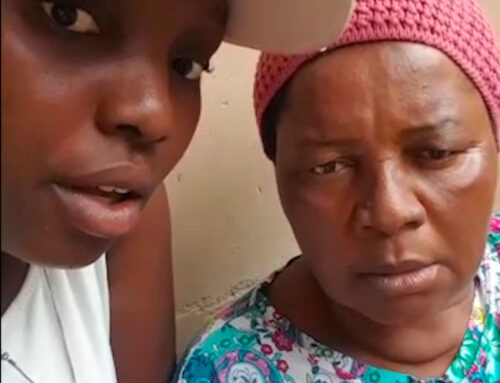Discover not just uncover – the UAE NCCHT report 2019
The National Committee to Combat Human Trafficking (NCCHT) in the UAE recently published its annual report for 2019. The report sets out the measures in place to combat trafficking and provides some insight into the international alliances being built.
Contained within the report is a summary of the number of cases which made court for 2019. In total, there were 22 cases of trafficking for sexual exploitation prosecuted involving 41 victims. To put this in context, in the 6 months since we set up Send Them Home, we have been aware of 22 Nigerian women trafficked to Dubai as a result of having been trafficked for sexual exploitation.
The NCCHT prevention strategy focusses on the visible elements of legitimate businesses and organisations that might contain trafficked persons within their ranks. This is clearly a very positive and necessary policy considering the UAE has a migrant labour force of 7.6 million people. For context, the International Labour Organization (ILO) estimate worldwide, 24.9 million people are trapped in modern-day slavery, exploited for labour. In the Uk, 6,993 potential victims were submitted to the National Referral mechanism in 2018.
The report sets out the sophisticated checks made at the point of entry to the UAE using biometric data collection and database checks. However, this will not capture the Nigerian women who are unknowingly being trafficked. Many fully believe, at least until they get to their madams houses in Dubai, Abu Dhabi and Al Ain that they are coming as nannies or for sales jobs. What needs to be improved is the system for issuing of work visas and checking the legitimacy of the businesses applying for them. There also needs to be more checking and tracking once victims are in the UAE.
The NCCHT has a process in place for the reporting of suspected trafficking incidents and to report oneself as having been trafficked. These protocols are difficult to access for Nigerian women:-
• Nigerian victims of sexual exploitation that arrive in the UAE have little formal education and have no understanding that they have travelled to another continent.
• Many victims can not read English
• Once in-country and in the control of their madams they have no passport or access to the internet
• Most Nigerian trafficking victims have to pay for their own visas so once in overstay they are unlikely to want to involve the Police for fear of a custodial sentence as a criminal
• The authorities dealing with trafficking are by and large are male.
The NCCHT runs Shelters for Victims of Human Trafficking (Ewa’a), based in Abu Dhabi. Ewa’a was originally established to serve under the umbrella of UAE Red Crescent but is now administered by Her Highness Sheikha Fatima bint Mubarak Al Ketbi https://www.gwu.ae/hh_resume/?lan=en. The organisation does great work but it’s highly unlikely any victim of trafficking would know of its existence. Most are referred by the Police and charities working in the UAE.
More could be done to advertise the existence of Ewa’a though the use of advertising and signposting within districts such as Deira where many Nigerians are forced to work and are being housed. Similarly, notices in the places the victims are forced to wok would be useful. A notice in the lavatories in nightclubs run by western hotels would be a useful way of offering Nigerian victims a route to Ewaa’s important services.
NCCHT signed a number of Memorandums of Understanding (MOU) with countries such as India regarding cooperation in combating human trafficking crimes and protecting its victims. There is no such arrangement with Nigeria and it’s unlikely that one will come into existence. The flood of women being trafficked north through Africa to Italy and Europe generally means the Nigerian focus is on the EU funded trafficking prevention schemes.
The NCCHT report concludes with the statement “The Concrete results include… a continued reduction in the number of human trafficking cases uncovered in the UAE”. Many of the Nigerian women trafficked to the UAE are being exploited (working) in full view of the public. Nigerian women trafficked to Dubai need to be discovered.

